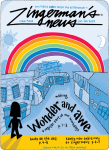Remember to Adjust for Distance

I’ve been driving awkwardly lately. Gear shifts come too late. I’m accelerating out of synch with my own gear shifts.
It’s not a life crisis or anything but I used to work in the auto industry and I like cars, and I bought a manual because I like driving cars. So it’s just really awkward when I drive awkwardly.
It’s been unseasonably warm in Michigan in the last few weeks and I’m practically delirious from it but that’s not why I’m driving weirdly. I’m driving weirdly because I went straight from winter boots to flip-flops – with absolutely no in-between of wearing just regular shoes not winter boots.
In doing that, I forgot to adjust for distance. I guess it used to be a gradual shift, but this time it wasn’t, and I clean forgot to adjust for that inch of padding in my access to the pedals.
I just forgot to adjust for distance.
So much awkwardness in our lives and businesses can be explained away by this inability to adjust for distance.
Merely adjusting for distance was the last thing that occurred to me with the car. I contemplated age, reaction time, my current, somewhat distracting, personal circumstances – my access to the pedals was the last thing that occurred to me!
My control of the car and the pleasure it gave me to wield that control had changed because of unexpected external circumstances. It was simple.
Part of that answer is self confidence, right? A simple and unshakeable understanding of your own competencies. I am a good driver. If I’m driving badly, something other than me must the problem.
The other part of it, I believe, is the inherent fear within us that external circumstances can, in fact, change the degree of control we believe we have on any situation, or our careers, our businesses, or our lives, for that matter.
Yes, I know, it’s a big leap from driving awkwardly to the notion of control over our lives and organizations. But stick with me.
One of the things I love about working in an Open Book Management company is the idea of forecasting. We write an annual plan each year for our goals for our 3 bottom lines (food, service, finance) but then each week we forecast. The idea of forecasting, the need to forecast is systemic at Zingerman’s.
We systemically acknowledge the power of the here and now and we forecast what we think the immediate future is going to look like, respecting the present, and what we had planned for. We acknowledge that when we wrote that plan we couldn’t possibly have known that when the time came we would have to move mountains to achieve it or that it would be, because of the current circumstances, so easy, that it was boring.
Instead, we let the forecast, fueled by the immediacy of the information we are gleaning from the present, be the impetus that drives us, knowing that there is jeopardy in our futures if we don’t meet the plan.
What choices do I have? I could:
Not meet the plan – I could quit driving because it feels awkward all of a sudden.
Pretend that the plan is the only truth – I could continue to drive awkwardly, not recognizing that summer, unexpectedly, came in March and then, replace my transmission next year.
Adjust for distance – Accept the surprising arrival of summer, pleasant or otherwise, and move my seat a notch forward and enjoy driving all over again.
What do you think I should do?




Zingerman’s Art for Sale